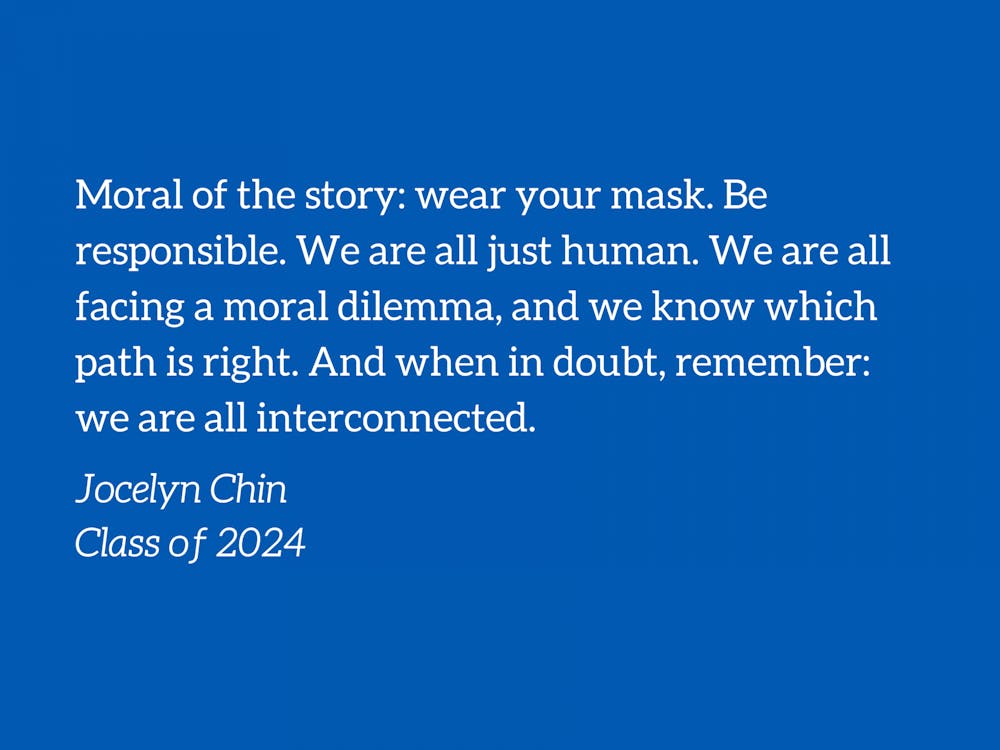Sunday night before FDOC, I watched "Interstellar" with a few friends in Trinity’s movie theater. I was extremely drawn into the movie with a plot so seemingly bizarre yet authentic enough to become the tenth-highest-grossing film when it premiered in 2014.
In "Interstellar," former NASA pilot Joseph Cooper (played by Matthew McConaughey) is given the task of saving all humans because Earth is running out of resources in 2067. Cooper pilots the scientists’ ship through a mysterious wormhole — near Saturn and a black hole named Gargantua — to a galaxy with potential worlds for a new human colony.
During the trip, Cooper and the rest of the crew face this dilemma: they can either abandon all human life on earth and start a new human colony with a high chance of success, or they can take the far riskier route of trying to start a new colony while also saving the humans on earth (which would require them to physically look over the event horizon of Gargantua in order to find data that would help calculate some sort of gravitational sum that would allow all humans to leave earth).
Anyways. It’s complicated, and I’m no astrophysicist. However, throughout the entire movie, I was haunted by the resemblances between characters’ lives and our current situation on earth. Human connection through screens across physical distances, a world with collapsing natural resources and the persistent turmoil between rational science and subjective emotions… I believe our individual college experiences this fall, and perhaps next spring, are implicitly interconnected with the plot and morals of "Interstellar."
Cooper and the other ship crew members argued vigorously when he insisted on making the choice of risking the future of mankind to save the people then living on earth, specifically his children Tom and Murph (but mostly Murph. Sorry Tom). The playing around of the worth of human life, and also of protecting one’s family and oneself versus the greater good is an idea that is currently relevant to American society today.
Gargantua, the black hole, is to Cooper in some ways as COVID-19 is to us. We continuously fail to see past the horizon, and are stuck in a space of immense uncertainty and looming danger. Yet Cooper risked it all (full send, fr), and college students comparably and unconsciously believe themselves to be invincible.
Take me, for example. I falsely believed that even though I go to bed at three a.m., I could still function as a proper human being when I get out of bed at seven. My friends and I joke about our lack of sleep as if it were actually funny. We so easily use our youth as an excuse to compromise fractions of our lives for others. Another example: compromising personal and community safety for conserving your social life.
Our movie’s main character was willing to risk it all to save his children at the expense of all the lives on earth. Do college students really want to risk the health and wellbeing of others and themselves in order to keep temporary epicurean joy in their own lives?
As undergraduate students, we are assumedly in the 18-29 year old age group. According to the CDC, compared to us, adults in their 30s are four times more likely to die from COVID-19. Adults in their 40s are ten times more likely. 50-62 year olds, 30 times. 65-74 year olds, 90 times. We are the healthy astronauts, the scientists, trying to forge a new path, the ones out of immediate danger. But we do not live in a bubble. We do not float safely on a ship where time is warped differently and thus allow us to avoid death while others cannot. We have hybrid and in person classes, meaning students come in contact with professors, who then also return home to their families. We have students who go to work. We have upperclassmen traveling to and from campus. We have immune-compromised students. We are not the only people on earth, and we have a duty to act as citizens who share a common home.
Cooper chose the rationally less responsible choice of risking the entirety of humanity to save his children. Of course, there’s not quite a direct parallel between a parents’ love for their children and a college students’ love for their social life, but in the same way, we are putting other human lives at risk with our emotions. Interestingly enough, the message that director Christopher Nolan seemed to want to send is that emotions triumph science and love triumphs all. Our main character pursued love, and his legacy was one of success.
However, if your takeaway from the positive ending of the movie is that emotion can indeed triumph over science which means you can let your emotions lead you through this pandemic, you are mistaken. Hate to break it to you, but you are not living in a movie. You are not the main character. There’s no plot armor to protect you or those around you in the end. Though it is unlikely that a misstep will end with you floating around in a futuristic tesseract intertwined with your daughter’s bookshelf by gravitational forces, there are still life-altering consequences.
Moral of the story: wear your mask. Be responsible. We are all just human. We are all facing a moral dilemma, and we know which path is right. And when in doubt, remember: we are all interconnected.
Jocelyn Chin is a Trinity first-year. Her column runs on alternate Wednesdays.
Get The Chronicle straight to your inbox
Signup for our weekly newsletter. Cancel at any time.
Jocelyn Chin is a Trinity junior and an opinion managing editor of The Chronicle's 118th volume.

